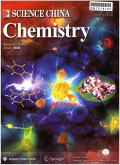- 钛学术文献服务平台 \
- 学术期刊 \
- 基础科学期刊 \
- 自然科学总论期刊 \
- 中国科学:化学(英文版)期刊 \
Shapeable carbon fiber networks with hierarchical porous structure for high-performance Zn-I2 batteries
Shapeable carbon fiber networks with hierarchical porous structure for high-performance Zn-I2 batteries
基本信息来源于合作网站,原文需代理用户跳转至来源网站获取
摘要:
Aqueous rechargeable zinc-iodine batteries(ZIBs)emerging as a promising energy storage alternative have attracted con-siderable attention.However,ZIBs still suffer from the severe shuttle effect of polyiodide and poor reversibility,leading to the poor cycling lifetime and potential safety issues.Herein,the assembly of Al-based metal-organic frameworks(Al-MOFs)in the presence of polyacrylonitrile(PAN)via electrospinning technique enables the formation of Al-MOF/PAN fibers.With the subsequent pyrolysis,the hierarchical porous carbon fibers with nitrogen doping(NPCNFs)are prepared for loading iodine.Benefiting from the confinement effect of the highly porous carbon network and the nitrogen doping,the self-supported carbon nanofiber electrode is capable of inhibiting the shuttle effect of polyiodide species.Especially,the in-situ Raman spectroscopy reveals the reversible two-step conversion reaction between iodine and polyiodide,which enables the best cycling stability for over 6,000 cycles with negligible capacity.This work demonstrates an efficient approach to regulating the porous structure and surface properties in the design of advanced iodine electrodes for high-performance ZIBs.

推荐文章
Rapid and sensitive method for determining free amino acids in plant tissue by high-performance liqu
HPLC
OPA
FMOC
Free amino acids
Plant
PLS-DA
内容分析
关键词云
关键词热度
相关文献总数
(/次)
(/年)
文献信息
| 篇名 | Shapeable carbon fiber networks with hierarchical porous structure for high-performance Zn-I2 batteries | ||
| 来源期刊 | 中国科学:化学(英文版) | 学科 | |
| 关键词 | |||
| 年,卷(期) | 2022,(2) | 所属期刊栏目 | ARTICLES |
| 研究方向 | 页码范围 | 391-398 | |
| 页数 | 8页 | 分类号 | |
| 字数 | 语种 | 英文 | |
| DOI | |||
五维指标
引文网络
引文网络
二级参考文献 (0)
共引文献 (0)
参考文献 (0)
节点文献
引证文献 (0)
同被引文献 (0)
二级引证文献 (0)
2022(0)
- 参考文献(0)
- 二级参考文献(0)
- 引证文献(0)
- 二级引证文献(0)
引文网络交叉学科
相关学者/机构
期刊影响力
中国科学:化学(英文版)
主办单位:
中国科学院
出版周期:
月刊
ISSN:
1674-7291
CN:
11-5839/O6
开本:
16开
出版地:
北京东黄城根北街16号
邮发代号:
创刊时间:
1950
语种:
eng
出版文献量(篇)
4060
总下载数(次)
0
总被引数(次)
11421
期刊文献
相关文献
推荐文献
- 期刊分类
- 期刊(年)
- 期刊(期)
- 期刊推荐
力学
化学
地球物理学
地质学
基础科学综合
大学学报
天文学
天文学、地球科学
数学
气象学
海洋学
物理学
生物学
生物科学
自然地理学和测绘学
自然科学总论
自然科学理论与方法
资源科学
非线性科学与系统科学
中国科学:化学(英文版)2022
中国科学:化学(英文版)2021
中国科学:化学(英文版)2020
中国科学:化学(英文版)2019
中国科学:化学(英文版)2018
中国科学:化学(英文版)2017
中国科学:化学(英文版)2016
中国科学:化学(英文版)2015
中国科学:化学(英文版)2014
中国科学:化学(英文版)2013
中国科学:化学(英文版)2012
中国科学:化学(英文版)2011
中国科学:化学(英文版)2010
中国科学:化学(英文版)2009
中国科学:化学(英文版)2008
中国科学:化学(英文版)2007
中国科学:化学(英文版)2006
中国科学:化学(英文版)2005
中国科学:化学(英文版)2004
中国科学:化学(英文版)2003
中国科学:化学(英文版)2002
中国科学:化学(英文版)2001
中国科学:化学(英文版)2000

 免费查重
免费查重










